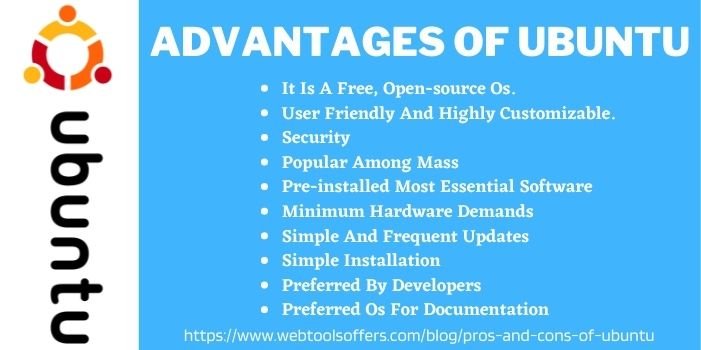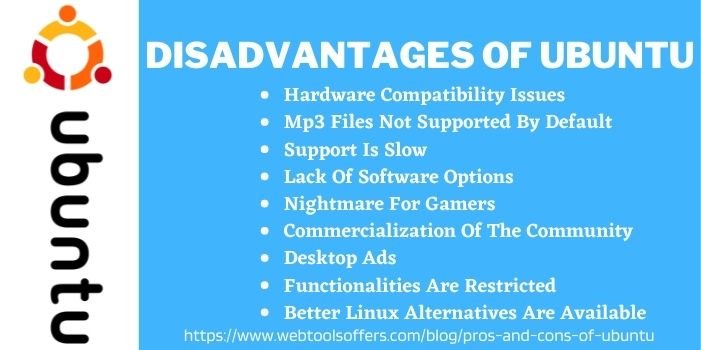Pros And Cons Of Ubuntu Linux Operating System 2025

You will find both kinds of people who love Ubuntu and who don’t. Still, Ubuntu has been popular since its inception. It has come a long way from being an open-source OS to a business-oriented hybrid of an open-source OS. Due to the changes it went through, Ubuntu witnessed a significant decrease in user base while some embraced it more with each year passed.
What we want to point out is that Ubuntu has always been a moot point for everyone. That brings us to today’s discussion about the pros and cons of Ubuntu that you must know before you revamp your PC right away.
First, we will see the advantages of Ubuntu, followed by its disadvantages. We will mention all facts and reports that we perceived from our testing and user reviews to make sure that we can deliver an unbiased and thorough analysis for our readers.
Detailed Pros And Cons Of Ubuntu Operating System 2025
If you are in a hurry, here is a quick overview of all the advantages and disadvantages of Ubuntu OS:
- It Is A Free, Open-source Os.
- User Friendly And Highly Customizable.
- Security
- Popular Among Mass
- Pre-installed Most Essential Software
- Minimum Hardware Demands
- Simple And Frequent Updates
- Simple Installation
- Preferred By Developers
- Preferred Os For Documentation
- Hardware Compatibility Issues
- Mp3 Files Not Supported By Default
- Support Is Slow
- Lack Of Software Options
- Nightmare For Gamers
- Commercialization Of The Community
- Desktop Ads
- Functionalities Are Restricted
- Better Linux Alternatives Are Available
Now Lets Read In Detail the Advantages Of Ubuntu

Free & Open-Source OS
Unlike leading operating systems like Windows, macOS, Ubuntu is free to use, being an open-source project. It is a huge differentiating factor for those who look for a robust IT infrastructure with low cost.
Imagine small companies, even the big ones out there, start using Ubuntu as their default operating system. The yearly budget will witness a significant plunge if that is the case. Apart from the cost-effective aspect, one should understand the perks of being a part of an open-source project. Open-source means stability, fresh, and up-to-date experience based on feedback from a massive user base.
User-friendliness And Customization Options
Ubuntu has been the flag-bearer for the influx of new users. Seasoned users got fewer, and new users got hold of this FOSS more and more. That resulted in more attention to its usability. The OS got more mature at par with Windows, macOS.
Canonical Ltd. revamped the UI towards beginner-friendly nature. The whole ecosystem became portable and freely accessible to all.
When it comes to the customization features of Ubuntu, we must say that it is one of the strengths of this OS. Ubuntu allows users the freedom to change the look and feel of the UI and the system. It even grants users control of the backend processes.
Security:
Ubuntu was the first such entity to introduce encrypted home directories that ensured greater security and privacy. Although it needs a bit of expertise to enable it, it is not undoable. While other OS makes you go through enough complexity to turn you down, Ubuntu has made it as easy to control as selecting a checkbox.
It is an open secret that the FOSS community always attempts to better its features and trace even the minimum loopholes in the project with the help of its active volunteers. This fact ensures enhanced security and more stability in the system.
Unlike Windows, Ubuntu will not bring onboard fears of flawed anti-viruses that slow down systems and include chances of back door security vulnerabilities.
Popularity Amongst Masses
Ubuntu boasted of its free distribution, user-friendly, easy-to-install outlook with access to the Linux world for the first time. Moreover, non-geeks were allowed to tinker with their PC and taste the sea of opportunities.
Ubuntu pioneered today’s Ubuntu-based distros like Linux Mint, Pinguy OS, thus emerged as a legacy builder for today’s developers.
Also, people loved that they could revive their old, abandoned PCs with the lightweight and less resource-hungry OS.
We will discuss how it is the most favorite go-to option for developers later in this article.
Pre-installed Most Essential Software:
Smartphone users often ponder why their PCs won’t come with the essential software, pre-installed like their smartphone.
Well, that is the case of Windows users, not Ubuntu users. Why? Because it comes with those pre-installed Music players, Office applications, Video and photo editors, inbuilt email client. Everything comes when you install Ubuntu.
It certainly is a great relief to those who hate picking and installing software that they may need.
Minimum Hardware Demands
One doesn’t need any powerful configuration before installing Ubuntu. We are sure any PC today can run it. The requirements as they put it on their site is 700 MHz processor, 512MB RAM, 5GB space in storage. It is pretty clear how humble demands these are.
Even if you don’t plan on loading it on your PC, you can use your external storage like a USB flash drive, SSD or even a DVD drive can do the job.
There is also provision for its ability to sideload on your windows PC without a fuss.
Simple And Frequent Updates:
Being a free open source software, you can expect a group of active developers to contribute to the software and hear your feedback. They work on your reported bugs, improve the code, solve issues and bring a stable version through version updates via the over-the-air medium.
As more and more people are coming on board, more brainstorming of ideas takes place. Users keep pushing their inputs regarding their preferred customization and other notable additions with the help of a dedicated forum. Developers take note, and this is how regular and timely feature updates show up in a FOSS.
Ubuntu is no exception. If the updates cause unprecedented errors, the same community comes forward to help users troubleshoot the problems.
Unlike what Windows users witness, Ubuntu updates are lightweight, which is why they don’t disrupt your ongoing project.
Overall it is an active and cooperative environment that helps the software thrive.
Simple Installation
Since 2004, when it released its first edition, Ubuntu was not that promising. But afterward, it showed signs of a possible breakthrough in the simplified installation process.
There was no longer typical jargon that conveys a simple instruction in a nightmarish way. Ubuntu showed up with simple checkboxes, minimal words with complete information, and most importantly, an easy language to do all these made it win hearts. Users no longer had to take a step back like how they did during other OS installations.
Preferred By Developers
I told you we would come for that. Sounds familiar? Maybe a similar line hit someone’s chest back in 2018? We all remember that to this day. Trust us. Developers heard about and preferred this OS more than you remember that line.
Why? Because this operating system is most suitable for running programs without any error. Beginners have been getting the recommendation constantly from their superiors to choose Ubuntu for the project. We can’t help but appreciate Ubuntu for such consistency.
Preferred OS For Documentation:
Frequently chosen by the people involved in documentation or database work, Ubuntu offers a user-friendly experience with LibreOffice, an office suite application pre-installed with the OS.
This application is free to use, unlike other OfficeSuite applications like Microsoft Office and others. It means Ubuntu cuts down a significant amount of cost regarding mandatory tools required for your job.
We have gone through what benefits us if we use Ubuntu. Now let’s take a look at the possible cons of this OS.
Let’s Read In Detail The Disadvantages Of Ubuntu

Ubuntu is undoubtedly a revolutionary invention for enthusiasts as well as developers. But is there really no cost implication that can demoralize the users? That is for us to ponder. Well, we dug deeper, and here are the disadvantages.
Hardware Compatibility Issues
It is known to all that hardware manufacturers are businessmen. They look for good revenue. That is why they invest in areas where they witness more footfall. In terms of OS, we see more people rely on Windows and macOS. That tells hardware manufacturers to make their products compatible with these leading OS programs.
Ubuntu, being a less popular choice, manages to get little to no support for driver issues. Like, if we mention names, Dell laptops and Desktops don’t seem to be compatible with Ubuntu OS.
The open-source project helps Ubuntu a lot. But in comparison with Windows and macOS, it is still far behind them in terms of driver compatibility.
Reportedly, wireless card drivers and sound cards often create problems for most users. We put this issue at number one for its most critical nature.
Mp3 Files Not Supported By Default
It’s shocking! Yes, it occurred to us too. Playing an mp3 file is a pretty basic thing. But Ubuntu doesn’t allow that owing to its restrictions. It requires you to install additional codecs or convert the mp3 files to the file format supported by Ubuntu to play the file. Video editors, musicians, or enthusiasts who need mp3 files in their profession should have this information beforehand.
Support Is Slow
Ubuntu doesn’t have any live support feature. You have to reach out to its forum to post your queries which may take 1 to 2 months to get addressed. It implies that customer support is horrible in this case. There is no dedicated Ubuntu support app inside the OS.
No matter how good a product is, its support system works as a backbone feature. In this case, we learn that Ubuntu can not be relied upon when the problem arises.
Lack Of Software Options
Alternatives never match up to the original product. So no matter how many alternative options we develop, the original one will always be ahead.
Also, like what we said in the context of hardware compatibility, software developers are more interested in putting their effort into companies that draw more masses. Microsoft Corporation and Apple Inc. are the most favorite options for the developers.
For all the above reasons, we don’t get to see that many good software options in Ubuntu compared to what we are used to seeing in Windows and the Apple store. Ubuntu apps are open-sourced and free, but they can’t match the quality we see in other operating systems. It also depends on popularity and faith. Windows and Apple software are industry-standard. Professionals incline more towards what is deemed industry-approved. Right?
Nightmare For Gamers
I am a gamer. I love to install the latest editions of all games. The gaming industry nowadays saw a revolution. It evolved so quickly that we could barely keep up. If you look at games released 5-years back and compare them with the recent game titles, you would be overwhelmed.
However, if you don’t play games a lot, if you don’t want to try the modern games now and then by being carried away with the fascinating trailers, Ubuntu will not let you down. But for those enthusiastic gamers out there, Ubuntu is disappointing news for all of you. It can run entry-level games but not advanced ones. The reason is that this OS lacks the support of advanced graphics drivers.
Commercialization of Community
An open-source project means a community that listens and responds to users’ feedback. With time when the popularity grows, commercial bodies walk in to build an association. It is beneficial for the project considering more funds back it up. The problem starts when the cornerstone aspects change.
Like in the case of Ubuntu, Canonical built the association, introduced Unity, resulting in disasters. Most users lost faith as this new association interfered with the community operation, stifled conversations on forums, and vetoed confirmed resolutions. Though Ubuntu dropped this malicious attempt of including the Unity project later, the fear already evoked couldn’t be retracted even to this date.
The very impression that Canonical seems to build by excluding the open-source aspect from its site is alarming and ungrateful both at the same time. The community made Ubuntu what it is today, and this whole scenario puts Ubuntu in a bad light.
Desktop Ads
Canonical’s very own Unity is responsible for bringing advertisements to the desktop UI. Ubuntu One, Music Store, and the affiliate services of Amazon are all such adware that clutters your desktop experience. Surprisingly though, the native Linux desktop is clean and ad-free.
That is why many users over the years switched to the Linux desktop from Ubuntu. While users got quite annoyed with such ads, Canonical rephrased it as some feature service. As usual, this futile attempt backfired, and it failed miserably with a significant drop in user base.
Functionalities Are Restricted
We already discussed the hardware and software shortages in Ubuntu. There are remaining features and functionalities that make an OS desirable to its users. Ubuntu’s Linux alternatives of Windows and macOS features are not at par with Windows and macOS.
If we compare the proprietary tools that come with Windows and macOS to Ubuntu, It can’t score higher. Developers thus face the scarcity of resources to make an equivalent level of products for Ubuntu, resulting in a confined environment for users.
Better Linux Alternatives Available
Ubuntu is not the only Linux-inspired OS out there. There are many, and some are even better. Debian OS has been there for a longer time. Debian is reportedly carrying more customization features with a more simple, lightweight effect on your hardware. It implies that your hardware will demand less than what Ubuntu does. Ubuntu is Debian-inspired. So clearly, Debian has the edge over Ubuntu.
Next up on the list is Linux Mint. This one is a successor to the legacy created by Ubuntu. It is an Ubuntu-based Linux distribution, so it is more upgraded than Ubuntu. Keeping in mind the commercialization dreads related to Ubuntu, we must say that Linux Mint is unblemished, open-sourced, community-centric, faster, and even lighter than Ubuntu.
Like Ubuntu, Linux Mint also brings onboard the basic applications saving users precious time before getting started.
WindingUp The Pros And Cons Of Ubuntu
Now you are well versed with all the advantages and disadvantages of Ubuntu. Ubuntu, as we perceived, is an excellent option for users who like to try new things at the cost of graphical compromises, prompt support service. But here is the thing. Ubuntu is there for long enough to build our reliance over it.
Despite having a troubled past, Ubuntu‘s new updates are bringing more and more exciting features. If you are a developer, you already know how it sounds. For the rest of you, it may be an option for you to try something out of the box or, you can choose to remain with your preferred ecosystem. This article will come in handy if you ever change your mind.


















